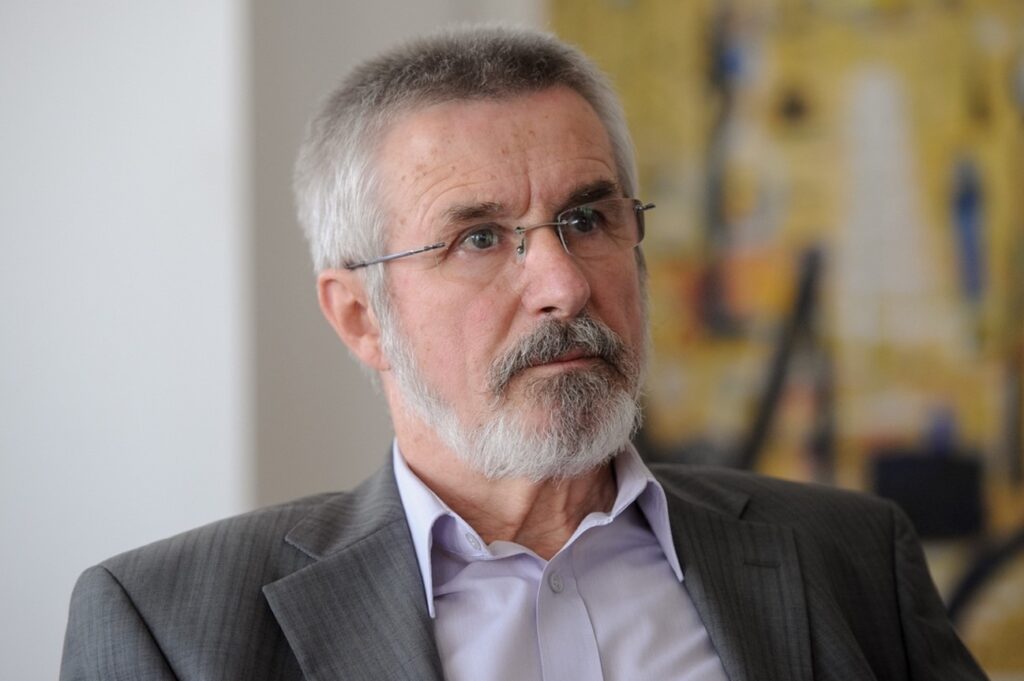“The fact that not everyone voted for this decision says a lot, but it also says that this decision is inconclusive and illogical. With the accusations of such a large number of deaths which the government is now being blamed for, the Constitutional Court still believes that the government’s powers are too broad,” the former Constitutional Court judge Dr Tone Jerovšek commented on the recent decision of the court that part of the Communicable Diseases Act is unconstitutional. “Very few people will actually benefit from this decision. Mutual political conflicts will be able to continue. And in the name of the principle of legality, as judge Dunja Jadek Pensa nicely explained, the National Assembly will have to meet requirements that are not realistic,” said Dr Matej Avbelj.
The Constitutional Court ruled that points 2 and 3 of paragraph 1 of Article 39 of the Communicable Diseases Act, on the basis of which the Government of the Republic of Slovenia is authorised to intervene and prohibit or restrict movement and gathering, are unconstitutional. However: the Constitutional Court has ruled that the part of the law that is controversial is the part, which was passed in 1995, during the government of Janez Drnovšek, which also included the former United List of Social Democrats, today’s Social Democrats (SD) party. The decision was made by the following judges: Matej Accetto, Špelca Mežnar, Marijan Pavčnik, Katja Šugman Stubbs and Rok Čeferin. The judges who voted against are Rajko Knez, Dunja Jadek Pensa and Marko Šorli.
We asked the former Constitutional Court judge and former president of the Constitutional Court, Dr Tone Jerovšek, to comment on the matter. “I find this decision to be scandalous. They are saying that the government is to blame for the 5,000 dead, the former Minister of Health has said this nonsense, but at the same time, they are saying that the government has too much power when it comes to the decisions on crossing the border, rallies and curfew. This is an example of internal inconsistency and indecision: when a decision is made that is contrary to logic.” However, it is true that the matter was annulled – Article 39 in the aforementioned points – but not eliminated, which means that it is not possible to intervene in the offences that were imposed on this basis, with lawsuits or appeals. Until such a decision is made, the law is valid, and the National Assembly now has two months to amend, correct and harmonise Article 39 with this decision.
“The fact that the president of the court Knez, as well as Jadek Pensa and Šorli, voted against also says a lot. The mere fact that not everyone voted for this decision says a lot, but it also says that this decision is inconclusive and illogical. With the accusations of such a large number of deaths which the government is now being blamed for, the Constitutional Court still believes that the government’s powers are too broad. It would be necessary to define them even more rigorously (in the Communicable Diseases Act), so that the Government of the Republic of Slovenia would have more powers to limit the spread of covid-19, as, for example, the Swedes had.” In Sweden, the National Assembly has given a general mandate to the government regarding all measures related to covid-19, and the parliament is not dealing with that at all. It is difficult to imagine what it would look like for the National Assembly to have to constantly adapt the provisions of the Communicable Diseases Act for individual measures in order to take action. That is crazy and completely illogical.
Avbelj: Very few people will benefit from this decision; the National Assembly will have to meet requirements that are not realistic
Legal expert Matej Avbelj told our media outlet: “In connection with this verdict, I welcome the concern of the majority in the Constitutional Court for the high declarative respect for selected human rights. The argumentation of the decision shows that human rights can also be instrumentalised in our country against all established canons of legal interpretations, including logical ones. In terms of respect for constitutional democracy, nothing is sacred anymore. However, the rule of law in our country is nothing but the rule of law, which is abused by everyone who can abuse it. Very few people will actually benefit from this decision. Mutual political conflicts will be able to continue. And in the name of the principle of legality, as judge Dunja Jadek Pensa nicely explained, the National Assembly will have to meet requirements that are not realistic. Even though the Roman law maxim already dictated that what is impossible is not right, in our country, of course, the opposite is true. Where there is power, there is will.”
Domen Mezeg


